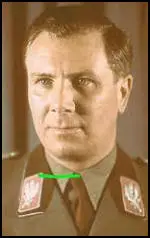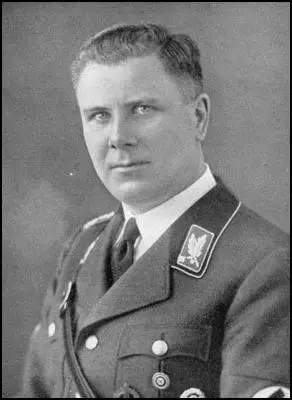Albert Bormann

Albert Bormann the son of Theodor Bormann, a post office employee, and Antonie Bernhardine Mennong was born in Wegeleben, Germany, on 2nd September 1902.
His brother, Martin Bormann, joined the National Socialist German Workers Party (NSDAP) in 1927. He became a close associate with Adolf Hitler. According to Louis L. Snyder: "Bormann rose steadily in the Nazi hierarchy... It was clear that Bormann, a master of the arts of intrigue and political infighting, was headed for lofty eminence in the Third Reich."
In April 1931 Martin used his influence to get Arthur Bormann a job with the Nazi Party Relief Fund in Munich. By October 1931, Bormann was assigned to Hitler's Chancellery of the NSDAP. It was responsible for the Nazi Party and associated organizations and their dealings directly with Hitler.
Albert Bormann & Adolf Hitler
Adolf Hitler liked Arthur but considered him inefficient when compared to his brother. "Where others need all day, Bormann does it for me in two hours, and he never forgets anything! ... Bormann's reports are so precisely formulated that I only need to say Yes or No . With him I get through a pile of files in ten minutes for which other men would need hours. If I tell him, remind me of this or that in six months, I can rest assured that he will do so. He is the exact opposite of his brother who forgets every task I give him."
Conflict with Martin Bormann
In 1933 he married a woman of whom his brother Martin Bormann disapproved because she was not Nordic. Hitler's secretary, Christa Schroeder, claimed: "The two brothers became estranged. If they were standing together, each would ignore the other. If for example Hitler gave one of them a job to pass to the other, that brother would send for an orderly officer to convey the instruction to his brother standing a few feet away. If one of the brothers told a funny story everybody present would laugh except the other brother who would keep a straight face."
Another secretary, Traudl Junge, added: "The hostility between the Bormanns was so habitual and firmly established that they could stand side by side and ignore each other entirely. And when Hitler gave a letter or request to the younger Bormann to be passed on to the Reichsleiter, Albert Bormann would go out, find an orderly, and the orderly would pass instructions on to his big brother even if they were both in the same room. The same thing happened in reverse, and if one Bormann told a funny story at table all the rest of the company would roar with laughter, while his brother just sat there ignoring them and looking deadly serious. I was surprised to find how used Hitler had become to this state of affairs. He took no notice of it at all."
Hitler seems to be aware of this conflict and in 1938, Arthur was assigned to a small group of adjutants who were not subordinate to Martin Bormann. Later that year Bormann became Chief of Persönliche Angelegenheiten des Führers (Personal Affairs of the Führer). In this job, Bormann handled much of Hitler's routine correspondence.

In the months following the July Plot Albert Bormann was involved in peace negotiations with the Allies. Heinz Linge later recalled: "When we were in his small private room, Hewel's representative and Albert Bormann, Martin Bormann's brother, appeared.... Albert Bormann and his colleague began their reports on the peace negotiations in Stockholm. Hitler listened for a while in silence. When Albert Bormann stated that the Allies were not prepared to enter serious negotiations so long as he, Hitler, remained head of state, the NSDAP continued to exist and the German forces were not ready to accept unconditional surrender, Hitler bristled. Providence, he retorted angrily, had not kept him alive on 20 July from caprice. As before he had been chosen and remained in position to give positive form to Germany's future. His enemies knew what outcome their conditions would have. He was therefore no longer prepared to allow the negotiations to proceed, he ordered, and without any further ado he dismissed the pair of them."
Albert Bormann in the Führerbunker
At the beginning of 1945 the Soviet troops entered Nazi Germany. On 16th January, Hitler moved into the Führerbunker in Berlin. He was joined by Arthur Bormann, Eva Braun, Gretl Braun, Joseph Goebbels, Magda Goebbels, Hermann Fegelein, Rochus Misch, Martin Bormann, Walter Hewell, Julius Schaub, Erich Kempka, Heinz Linge, Julius Schreck, Ernst-Gunther Schenck, Otto Günsche, Traudl Junge, Christa Schroeder and Johanna Wolf.
Hitler was now nearly fifty-five years old but looked much older. His hair had gone grey, his body was stooped, and he had difficulty in walking. People who had not seen him for a few months were shocked by his appearance. One man remarked: "It was a ghastly physical image he presented. The upper part of his body was bowed and he dragged his feet as he made his way slowly and laboriously through the bunker from his living room... If anyone happened to stop him during this short walk (some fifty or sixty yards), he was forced either to sit down on one of the seats placed along the walls for the purpose, or to catch hold of the person he was speaking to... Often saliva would dribble from the comers of his mouth... presenting a hideous and pitiful spectacle."
The situation became so desperate that on 22nd April, Hitler sent Albert Bormann, Christa Schroeder, Johanna Wolf, Dr. Theodor Morell, Admiral Karl-Jesco von Puttkamer and Dr. Hugo Blaschke, away. Schroeder later recalled: "He received us in his room looking tired, pale and listless. "Over the last four days the situation has changed to such an extent that I find myself forced to disperse my staff. As you are the longest serving, you will go first. In an hour a car leaves for Munich."
Bormann found work on a farm under an assumed name until he was arrested on April 1949. He was sentenced by a de-Nazification court to six months of hard labour and was released in October 1949.
Albert Bormann died in Munich in April, 1989.
Primary Sources
(1) Christa Schroeder, He Was My Chief: The Memoirs of Adolf Hitler's Secretary (1985)
Albert Bormann had been introduced by his brother Martin into the SA-Hilfskasse insurance scheme in 1931, from where he graduated into Hitler's private chancellery under Rudolf Hess, and took over running it from 1933. That same year he married a woman of whom brother Martin disapproved because she was not Nordic, and the two brothers became estranged. If they were standing together, each would ignore the other. If for example Hitler gave one of them a job to pass to the other, that brother would send for an orderly officer to convey the instruction to his brother standing a few feet away. If one of the brothers told a funny story everybody present would laugh except the other brother who would keep a straight face. When Albert Bormann divorced after a few years and married his ex-wife's cousin, he wanted to inform his brother of the fact. Martin Bormann refused to receive him with the remark: "I don't care if he marries his grandmother."
(2) Traudl Junge, To The Last Hour: Hitler's Last Secretary (2002)
The hostility between the Bormanns was so habitual and firmly established that they could stand side by side and ignore each other entirely. And when Hitler gave a letter or request to the younger Bormann to be passed on to the Reichsleiter, Albert Bormann would go out, find an orderly, and the orderly would pass instructions on to his big brother even if they were both in the same room. The same thing happened in reverse, and if one Bormann told a funny story at table all the rest of the company would roar with laughter, while his brother just sat there ignoring them and looking deadly serious. I was surprised to find how used Hitler had become to this state of affairs. He took no notice of it at all. Unfortunately I never managed to find out the reason for their enmity. I think there was a woman behind it. Or perhaps those two fighting cocks had long ago forgotten the reason themselves?
(3) Heinz Linge, With Hitler to the End (1980)
One day during one such stroll, unfortunately I do not recall the date but it was after 20 July 1944. Hitler broached the subject of peace negotiations. As I was merely a listener, he did not need answers to his questions, so as was his custom he could develop his ideas without interruption. He did not finish oft, though, and for no apparent reason changed thc subject. When we were in his small private room, Hewel's representative and Albert Bormann, Martin Bormann's brother, appeared. Hitler had them remain standing at the door, a comical situation, the two of them were blocking the exit. Whatever Hitler was intending was not clear to me. Apparently he wanted me present as a witness without actually saying so. Uncertainly, very cautiously, Albert Bormann and his colleague began their reports on the "peace negotiations" in Stockholm. Hitler listened for a while in silence. When Albert Bormann stated that the Allies were not prepared to enter serious negotiations so long as he, Hitler, remained head of state, the NSDAP continued to exist and the German forces were not ready to accept unconditional surrender, Hitler bristled. Providence, he retorted angrily, had not kept him alive on 20 July from caprice. As before he had been chosen and remained in position to give positive form to Germany's future. His enemies knew what outcome their conditions would have. He was therefore no longer prepared to allow the negotiations to proceed, he ordered, and without any further ado he dismissed the pair of them.
